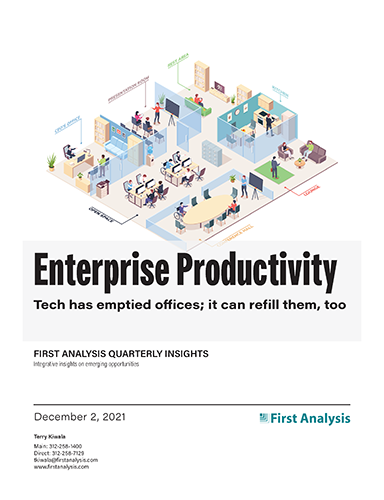Quarterly insights: Enterprise productivity
Tech has emptied offices; it can refill them, too

As the pandemic engulfed the world, workers and businesses found they could function remarkably well by using technology to conduct business almost entirely outside the traditional office. Among the most obvious impacts of this shift is a glut of unused office space.
While technology enabled the worker exodus and likely forever changed how and where work is done, it can also help landlords devise and implement new strategies for attracting and retaining tenants in this new world. One area where technology can be key is helping landlords quickly and efficiently reconfigure space to better address companies’ new and more fluid space needs. Another area is technology that enhances the value tenants and their employees derive from the space they continue to use.
We expect companies that provide these technologies to see strong growth in the coming years as landlords invest heavily to address the substantial changes in the office market. We profile several such companies.
TABLE OF CONTENTS
Includes discussion of eight private companies
- Landlords face a permanent sea change in the office-space market
- Technology for optimizing space can help landlords thrive in the post-pandemic world
- Innovative tech companies give landlords the tools they need
- In a world where space needs to be dynamic, tech tools will be a key to winning
- First Analysis Enterprise Productivity Index ends in line with Nasdaq, S&P 500
- Enterprise productivity M&A pace appears to slow in Q4
- Strong Q4 enterprise productivity private placement pace
Landlords face a permanent sea change in the office-space market
When the pandemic forced millions of workers to abandon their offices in early 2020, something astounding happened to many businesses: Nothing. While the pandemic has had many tragic consequences, the economy largely kept moving as workers and businesses found they could function remarkably well by using technology to conduct business without exchanging paper and without in-person interactions. Given this experience, most workers have yet to return to the office with any frequency, and it appears unlikely they will ever do so. Despite the easing of restrictions related to the spread of the pandemic’s delta variant, only 36% of workers had returned to traditional office environments the week of Oct. 8, according to security company Kastle Systems.
Among the most obvious impacts of this shift is a glut of unused office space. And with much of the workforce electing to continue working from home (or in some cases, being directed to do so by their employers), many companies are re-evaluating their medium- and long-term office space needs, usually with an eye toward reducing space. Given this trend, landlords face substantial uncertainty about the value of their properties.

Request full report
To access the full report, please provide your contact information in the form below. Thank you for your interest in First Analysis research.
